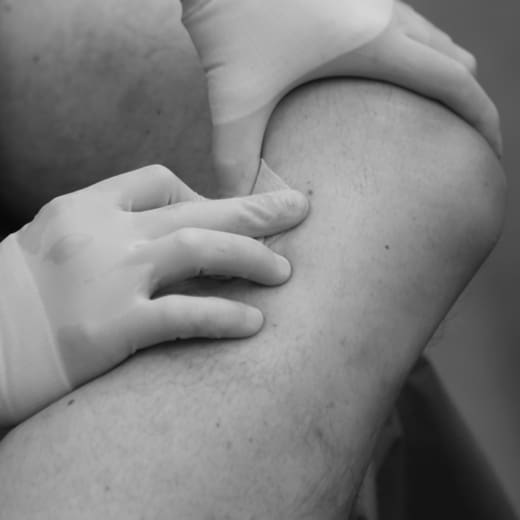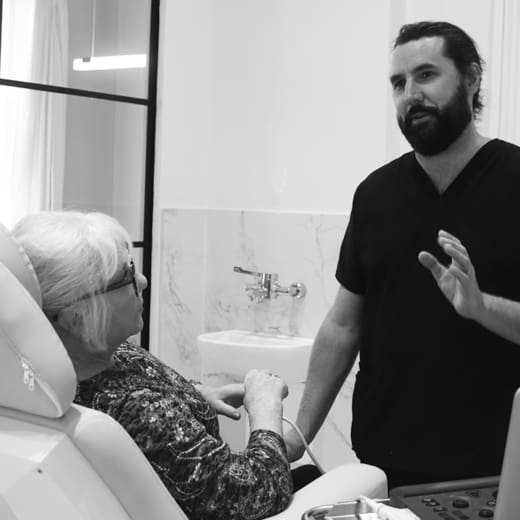McKeown Medical
167 Bath Street, Glasgow, G2 4SQ
Dr Alex Vesey is our expert consultant vascular surgeon who heads up our varicose vein team at McKeown Medical. Here, he discusses who is more prone to varicose veins.
Date posted — 26.08.24
Certain groups of people are more prone to developing varicose veins.
The first risk factor is genetics. Individuals with a family history of varicose veins are at higher risk due to genetic predisposition.
The next risk factor is age. As people age, vein elasticity decreases, increasing the likelihood of varicose veins.
The next risk factor is gender. Women are more likely to develop varicose veins due to hormonal changes from pregnancy, menstruation, or menopause, which can weaken vein walls – although men also commonly suffer.
The last big risk factor is obesity. Excess weight puts additional pressure on veins, increasing the risk of varicose veins.
We offer a range of treatment options for varicose veins, including VenaSeal™ – the most up-to-date method of treating varicose veins that causes less pain and allows you to get back to normal almost immediately, without the hassle of wearing bandages or compression stockings.
Get in touch with our friendly team, and we’ll help you find the right varicose vein treatment.

Dr Alex Vesey discusses whether varicose veins are dangerous.

Dr Alex Vesey discusses whether varicose veins are hereditary.

Varicose veins are enlarged, twisted veins that often appear just under the skin, primarily in the legs and feet.
1 / 3
2 / 3
3 / 3

Dr Alex Vesey discusses whether varicose veins are dangerous.

Dr Alex Vesey discusses whether varicose veins are hereditary.

Varicose veins are enlarged, twisted veins that often appear just under the skin, primarily in the legs and feet.
In case you missed it, here’s Dr Rhona and Dr Iain’s live Q&A discussing everything to do with periods and heavy menstrual bleeding.
Thanks to everyone who joined and asked questions. We’ll be doing more of these so keep an eye out for the next one!
And if you’d like to know more about the treatments we can offer for heavy menstrual bleeding, check out the link in our bio!

Thank you to our incredible patient for allowing us to share these pictures with you.
This patient has been with me for years but the thing we have always struggled with has been the texture of the skin around the mouth and lower face which has had a lot of sun over the years.
We’d tried less invasive options but ultimately when the skin changes get to this level the only thing that makes a dramatic improvement is full field resurfacing.
There is literally no other treatment capable of undoing sun damage like this. The patient is only a few weeks post-op and still a bit red so she is wearing make up to hide the redness, but already obsessed by the texture of her new skin.
What do you think?
If you`d like to know if you`d benefit from this treatment send us a DM with some pictures or visit the link in our profile for more information on full laser resurfacing.

We`re going live on Wednesday at 7PM! Join Dr Rhona and Dr Iain (@driainmartin) on Instagram live, where they`ll be discussing everything about periods and heavy menstrual bleeding including:
What is “normal” when it comes to menstruation
Heavy periods - what is a heavy period and what might be causing it
Myths vs facts - getting the right information and the right treatment for period problems
They`ll also be answering your questions live, so if there`s anything you`d like to ask, leave a comment or head to our stories. We hope you can join us!

Since we are now in full swing filler season, I’m very grateful to this patient for allowing us to share her pictures to demonstrate how much lift we can achieve just using filler.
Discover more about our method at the link in our bio.

Summer is almost here! If you’re putting off wearing your favourite summer dresses and shorts because of varicose veins, now is the time to think about treatment.
Varicose veins aren’t just a cosmetic concern - they can ache and throb, as well as make us feel self-conscious, especially as the warmer weather approaches.
With so many treatments available, it can be difficult to know where to start. Here’s our lovely Dr Alex with a quick overview of how we can help reduce discomfort, improve appearance and boost your confidence in time for summer.
If you, or someone you know, have been thinking about treatment, now is a great time to explore your options with plenty of time to feel the benefits before summer - check the link in our bio for more details.

Now that spring has finally sprung we are very much in peak time for filler treatments in the clinic.
So many patients would benefit from filler, but are scared of them because of the horror stories so I wanted to share a few examples this week of what filler looks like - in the correct hands!
Here are some examples of the natural looks we achieve with the McKeown Method.
Discover more about our method at the link in our bio.

What a difference a week is! This is one of our patients just a week out from her deep plane face and neck lift by the ever so talented @bramhallplasticsurgery.
The deep plane technique is the most technically challenging facelift to perform and Russell remains the only surgeon in Scotland performing this procedure, which involves going much deeper into the face to reposition the tissues rather than just pull them tight.
The outcome is a much more effective rejuvenation, even in unflattering poses when your head is bent forward, and a result that lasts much longer than a traditional facelift.
What do you think?

Thank you so much to our wonderful patient for allowing us to share her before and after pictures. She’s around 6 weeks after full field resurfacing.
One of the great things about this treatment is that, in addition to wiping wrinkles away, it also gives some pretty impressive skin tightening too. If you look at her forehead, upper and lower eyelids you can really see how much tighter the skin is.
The stubborn forehead lines and lines through the eyebrows have gone and, of course, the lines around the mouth are significantly reduced. These will continue to improve for up to six months as the skin continues to heal. She’s still a little pink, which will fade over the next few months, but with a little tinted moisturiser you’d never know. The patient is over the moon.
What do you think?
We can now offer full laser resurfacing with sedation and you can see more about the procedure in the link in our profile.

Yesterday we announced that we’re the first clinic in Scotland to have the CoolSculpting® Elite so today I wanted to show you an example of the kind of results we can achieve with this treatment.
We’re so grateful to this patient for allowing us to share her results before and after CoolSculpting®. As you can see here, she had a stubborn area of fat around her belly which she was finding difficult to shift with diet and exercise alone.
She’s absolutely delighted with the result - what do you think?
For more information on CoolSculpting® and to get booked in to be ready for summer, check out the link in our bio.
